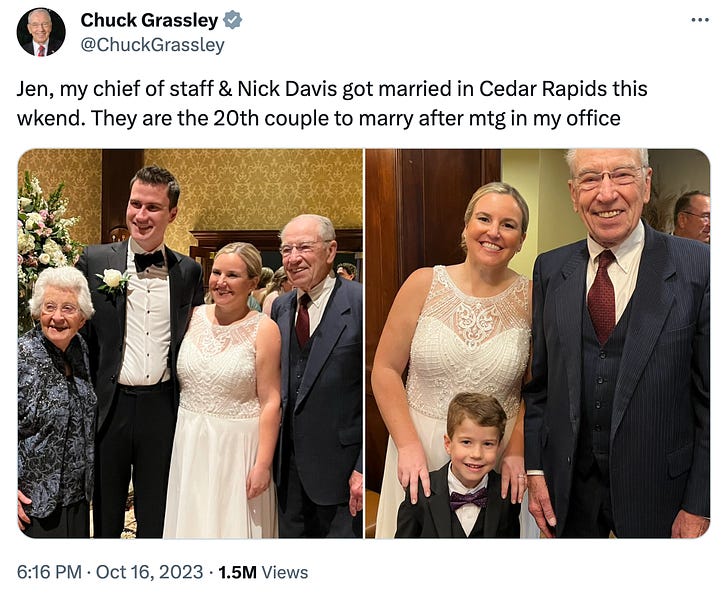Weekly Digest: A Flock of Demons
Jonathan Haidt on campus upheavals, How the Marine Corps recruits, and other news from around the web.
Welcome to my weekly digest for October 20, 2023, with the best articles from around the web and a roundup of my recent writings and appearances.
I saw some people wondering where the term “servant leader” originated. It comes from a man named Robert K. Greenleaf, whose initial essay on the topic was called “The Servant as Leader.”
Best of the Web
Jonathan Haidt just posted the forward he wrote to a new book called The Canceling of the American Mind. This caught my eye:
Sometime around 2014, something big changed in American society. It was as if a flock of demons was unleashed upon the world, and the first place they flocked to was American college campuses.
2014 of course, is the year that I selected as the start of what I call the negative world. Some people like to argue against my negative world thesis, but outside scholars like Haidt noticed big ruptures in society about the same time. Call it what you want, major change hit America during Obama’s second term.
NYT: U.S. Army, Navy and Air Force Struggle for Recruits. The Marines Have Plenty.
Military leaders say there are so few Americans who are willing and able to serve, and so many civilian employers competing for them, that getting enough people into uniform is nearly impossible.
Tell that to the Marines.
The Marine Corps ended the recruiting year on Sept. 30 having met 100 percent of its goal, with hundreds of contracts already signed for the next year.
The corps did it while keeping enlistment standards tight and offering next to no perks. When asked earlier this year about whether the Marines would offer extra money to attract recruits, the commandant of the Marine Corps replied: “Your bonus is that you get to call yourself a Marine. That’s your bonus.”
In a nutshell, that is the Marine Corps’ marketing strategy: Dismiss financial incentives as chump change compared with the honor of joining the Corps. Brush off the idea of military service as a steppingstone to civilian career opportunities. Instead, dangle the promise of the chance to be part of something intangible, timeless and elite.
Financial Times: How disadvantage became deadly in America
It hasn’t always been this way. In the 1980s, the most disadvantaged Americans lived about as long as their counterparts in France. By the early 2000s, lives at the bottom had lengthened considerably, and while a deficit was opening up, it wasn’t worrisome. But in the past decade, the lives of America’s least fortunate have shortened by an astonishing eight years. That gap with France has become a yawning gulf. What has happened?
It is common to reach for economic explanations. Widening inequalities in American longevity must be due to widening inequalities in American incomes. Shorter lives for those at the bottom must be due to a decline in material wellbeing. But the evidence suggests otherwise.
…
In most wealthy countries, if you’re desperately unlucky in the longevity stakes, you succumb to cancer before you reach 60. But if you’re unlucky in the US, you die from a drug overdose or gunshot wound by 40. Which brings us again to the most shocking statistic: among the least fortunate 10 per cent of American men, the average age at death is 36. [emphasis added]
Matt Yglesias interviews Melissa Kearney about her book The Two-Parent Privilege.
Ted Gioia: My 12 Favorite Problems - Interesting thoughts on what drives his writing, research, thinking, and actions.
New Content and Media Mentions
I got a mention this week in Law and Liberty and the Minneapolis Star-Tribune.
New this week:
In case you missed in, my monthly newsletter out Monday was about the problem with servant leadership.
The Quest for Male Community - Men are looking for real community with other men
Remote Work Can Thrive in Remote Places - My Governing column this month is on how places can connect their existing residents to remote work opportunities.
Post-Script
I previously wrote about how the New York Times had branded Chuck Schumer the “Yenta of the Senate” for his matchmaking efforts in his office. It looks like Chuck Grassley is trying to give him a run for this money, announcing the 20th marriage to result from people meeting while working in his office. There must be something about the name “Chuck.”






I wonder how many marriages were arranged by Chuck Norris.
My experience was that it felt like the world became fundamentally different after 2012. That was the year the smart phone became ubiquitous. Pre-2012 I still knew people who had flip phones and some who didn’t even have a cell phone; after 2012 everyone I knew had a smart phone.